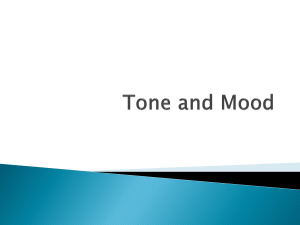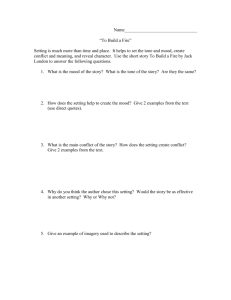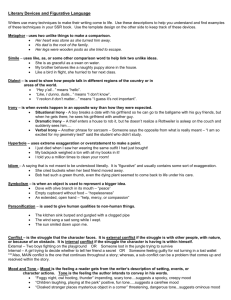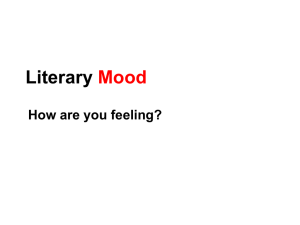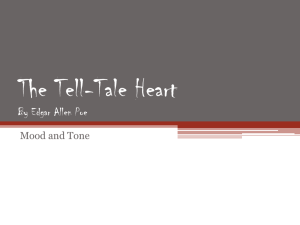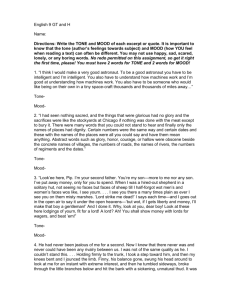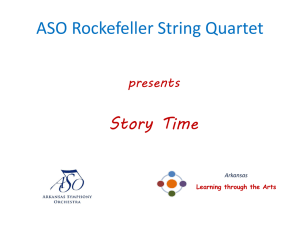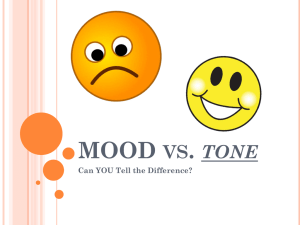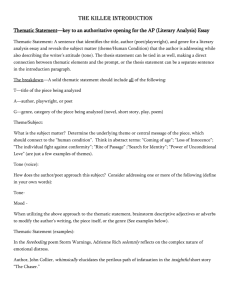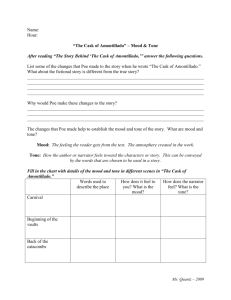Tone and Mood PPT
advertisement
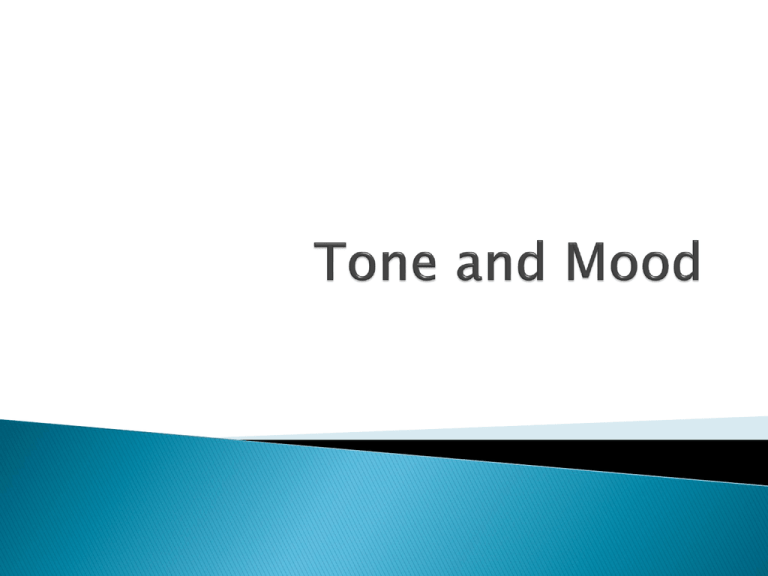
is the author’s attitude toward the subject, the characters or the readers, which is revealed by the author’s diction. Tone Explain the difference between the following sets of words: Silly/Giddy-silliness implies an element of childish behavior whereas giddiness implies happiness. You can be giddy without being silly. Angry/upset - Mocking/sarcastic - Angry Sharp Upset Silly Boring Afraid Happy Hollow Joyful Allusive Sweet Vexed Tired Bitter Dreamy Restrained Proud Dramatic Sad Cold Urgent Joking Poignant Detached Confused Childish Peaceful Mocking Objective Vibrant Frivolous Audacious Shocking Somber Giddy Provocative Sentimental Fanciful Complimentary Condescending Sympathetic Contemptuous Apologetic Humorous Horrific Sarcastic Nostalgic Zealous Irreverent Benevolent Seductive Candid Pitiful Didactic “This is Just to Say” by William Carlos Williams I have eaten the plums that were in the icebox and which you were probably saving for breakfast Forgive me they were delicious so sweet and so cold 5 10 Tone word: Insincere Explain: While Williams attempts to say he is sorry, “Forgive me” (ln. 9), the insincerity of his apology is evident as he waits to ask for forgiveness until the last stanza of the poem. Additionally, he goes on to explain how good the plums were that she was saving for breakfast “they were delicious/so sweet/and so cold” (ln. 10-12). The fact that he rubs in how good the plums were shows he wasn’t sincere in his “apology.” YOU TRY: Pick a tone word and explain. Remember, you must always back up your explanation with evidence from the text. Mood is the feeling a piece of literature arouses in the reader. It is the atmosphere created by the author. Some literature makes us feel joyful, solemn, angry, etc. Mood is often created by setting. “The Fall of the House of Usher” by Edgar Allen Poe During the whole of a dull, dark, and soundless day in the autumn of the year, when the clouds hung oppressively low in the heavens, I had been passing along, on horseback, through a singularly dreary tract of country, and at length found myself, as the shades of the evening drew on, within view of the melancholy House of Usher…I reined my horse to the precipitous brink of a black and lurid tarn that lay in unruffled luster by the dwelling…[with] vacant and eye-like windows. Mood word: Depressing Explanation: The setting of this short story is at a house that is described as melancholy. Additionally, the day is “dull, dark, and soundless.” The depressing diction here creates a feeling of sadness. Additionally, the story is set in autumn, a time of year when the leaves are “dying” and the summer is “dying.” Of Mice and Men by John Steinbeck The deep green pool of the Salinas River was still in the late afternoon. Already the sun had left the valley to go climbing up the slopes of the Gabilan mountains, and the hilltops were rosy in the sun. But by the pool among the mottled sycamores, a pleasant shade had fallen. Of Mice and Men by John Steinbeck A water snake glided smoothly up the pool, twisting its periscope head from side to side; and it swam the length of the pool and came to the legs of a motionless heron that stood in the shallows. A silent head and beak lanced down and plucked it out by the head, and the beak swallowed the little snake while its tail waved frantically. • • • • Find a passage from Of Mice and Men that communicates a specific tone and mood. Write the section on notebook paper and indicate the page where it was found. Use a tone word to describe the tone of the passage and provide context clues in your explanation. Do the same with a mood word.
